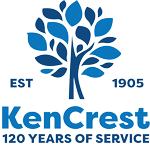KenCrest Academy: Birth-Five
Welcome to the KenCrest Academy for Birth-Five!
———————————————
This section of our website provides access to the Preservice training and some of the required annual training for KenCrest Birth-to-5 providers to complete. Topics vary; some are designed for professionals in specific areas, and others are designed for all providers. Begin by selecting a category to see what topics are available.
PLEASE NOTE: All of our trainings are in PDF format or a link to another training site. The PDF files can be viewed on any browser or device.
Preservice Training – Completion of the training documents in this section is required prior to seeing children.
Annual Training –The Department of Public Welfare requires that all EI staff complete 24 hours of training each year, in addition to PreService Training, in order to continue to work in the system. All of the annual trainings must be completed each year as part of the required 24 hours of training. The annual trainings are housed on Relias which is our Learning Management System. Relias will track your attendance on a transcript, issue certificates, and send you reminders when courses are due.
Professional Development & Resources
In this section, you will find some additional training modules and resources available for credit toward the 24 hours in Birth-to-3 programs.
Early Intervention Technical Assistance PA Learning Path
Family Guided Routines Based Intervention
Families First | Institute on Disabilities | Temple University Institute on Disabilities
Additional Ways to Get Training Hours
This section includes informational articles that can expand your skills in working with children.
Download and complete the Training Outcome Form (WORD format) or Training Outcome Form (PDF format) to receive credit for reading relevant journal articles (1 hour), books (up to 3 hours) or viewing videos (length of video) related to your practice. Return the completed form to your supervisor to obtain credit.
Resources to Share with Families
Zero to Three
Zero to Three’s mission is to promote the health and development of infants and toddlers. The website includes age-based developmental information, free parent brochures and guides, and a host of other information for professionals and parents.
There is no such thing as a perfect parent. Parenting is an ongoing process of learning who your child is and what he needs to thrive. Our resources are designed to help you tune in to what makes your child tick and guide you in thinking about the best way to meet your child’s needs.
Therapists as Collaborative Team Members for Infants and Toddlers
This website, developed by Juliann Woods, PhD, from the University of South Florida, contains useful information on implementing a routines-based approach in Early Intervention.
Family-guided Approaches to Collaborative Early Intervention Services
This website provides resources and training for families and professionals in implementing a routines-based approach. The site includes reproducible training modules.
Training and Learning Collaborative (TLC)
Philadelphia County Infant/Toddler Early Intervention personnel can access this website to learn about policies, procedures, and upcoming trainings. The site also contains online training in cultural competence, routines-based intervention, and the IFSP process.
The Importance of Home Language Series
This series of handouts is designed to provide staff and families with basic information on topics related to children learning two or more languages. Staff and family handouts are available in six different languages. They emphasize the benefits of being bilingual, the importance of maintaining home language, and the value of becoming fully bilingual. These easy-to-read resources highlight important information that every adult living or working with young dual language learners should know.
Birth to 5: Watch Me Thrive!
This is a coordinated federal effort to encourage healthy child development, universal developmental, and behavioral screening for children, as well as support for the families and providers who care for them.
